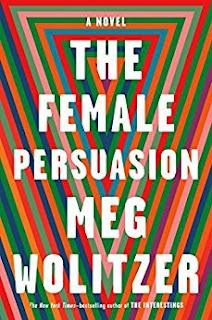The Female Persuasion by Meg Wolitzer: A review
"Women in particular ... I want you to get more involved. Because men have been getting on my nerves lately."
- Barack Obama hosting a town hall in Johannesburg this week.
Meg Wolitzer has written a book about feminism whose timeliness can hardly be overemphasized. Indeed, its narrative in many ways seems wholly lifted from the news stories of the day.
We have the naive young college freshman named Greer Kadetsky who is the novel's primary protagonist. Greer had hoped to be going to an Ivy League college, but because of her incompetent parents' failure to complete all necessary forms on time, she ends up going to second-rate Ryland College, while her long-time boyfriend, Cory, goes to Princeton. Though her college may be second-rate, she makes a first-rate friend in a queer girl named Zee Eisenstat.
Zee convinces Greer to go with her to a party at a frat house on campus and it is there that the all too familiar story of sexual assault takes place. Greer is forcefully groped by a drunken and entitled "bro" from the frat. Shaken and sickened by the experience, Greer is finally convinced by Zee that she has to report it and, when she does, other girls come forward to tell of similar experiences with that same jerk. After an investigation, the groper gets a slap on the wrist but continues in college and life for his victims is diminished by the lack of justice.
Somewhat later, a famous, or perhaps notorious, feminist called Faith Frank comes to campus to speak and Greer gets a chance to talk with her one on one and tell her story. Faith inspires Greer to persevere and to overcome obstacles to be a force for change and for making the world a better place, a safer place for women. It is the beginning of a relationship that will change and give direction to Greer's life.
Much of this tale is told from Greer's perspective but we also get to know Cory, Zee, and Faith individually and to learn how they came to be who they are. The focus, though, is Greer and her relationships with Cory, Zee, and Faith.
After college, Greer gets an opportunity to go to work for Faith in a new foundation that is to give a hand up to women around the world, to help them become self-actualized and effective in their communities and countries. Through their relationship, Wolitzer explores the sometimes provocative and confrontational world of intergenerational feminism. How can a young woman of the 21st century relate to a woman who went through the struggles of the '60s and '70s and who made what seemed at the time to be necessary compromises to accomplish the difficult task of raising women up and fighting for equality in the world? On the other hand, how can a woman from the '60s begin to understand the challenges faced by young women today and the impatience they feel with the patriarchal assumption that male dominance is the way the world should be? Their mentor/mentee relationship eventually founders on the rocks of the cynical compromises of the mentor and the righteously indignant judgment of the mentee.
Along the way, Greer's relationship with Cory also founders after a horrible accident that rocks both their worlds and broke the heart of this reader, and the relationship with Zee is broken through Greer's feelings of guilt over her betrayal of Zee when Zee had asked for her help in finding a job.
So much of this book resonates with the current political climate in this country; even to the end when Zee and Greer learn that the young man who assaulted and shamed Greer in college is still engaged in those activities fifteen years later. Only now he does it online! Yes, he now has a revenge porn website where he and other lowlifes like him can assault and shame women in view of the world.
Truly, men are getting on my nerves, too, Barack.
Wolitzer's novel is full of wit and insight and gives its readers a lot to contemplate. It would be nice to think that this book would be read by both women AND men, but I am not hopeful that those of the male persuasion will pick it up and give it the serious attention it needs. The book has its flaws, I suppose, but it is a reminder of how important it is that each of us do what we can to change the world, no matter how small our contribution may seem. It's the only way we can progress in this "big terribleness," as Wolitzer calls our current situation - one woman rising at a time.
My rating: 5 of 5 stars

Great review, Dorothy! It is important that us women tell our stories to effect change in the world, even if it is one step at a time.
ReplyDeleteThat pretty much sums up the message that I got from this book.
DeleteSome years ago I banned Meg Wolitzer from my lists, for various reasons I won't go into here. You have almost convinced me to give her another chance.
ReplyDeleteWe all have our reasons for choosing what to read or not read. I respect yours. I had not read Wolitzer before but as my review indicates, I found this book insightful and stunningly prescient in that it was actually written, I understand, over a period of about the previous three years.
Deletethanks Dorothy - I did try to read this but couldn't get into it. Maybe I wasn't in the right frame of mind. I may give it another go. Cheers
ReplyDeleteI think it may be a book that you either love or hate. I loved it obviously, but some of my friends were a lot less positive about it.
Delete